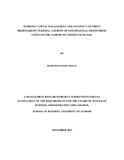| dc.contributor.author | Mitau, Martin S | |
| dc.date.accessioned | 2013-11-11T09:08:41Z | |
| dc.date.available | 2013-11-11T09:08:41Z | |
| dc.date.issued | 2013-11 | |
| dc.identifier.citation | Degree of Master of Business Administration | en |
| dc.identifier.uri | http://erepository.uonbi.ac.ke:8080/xmlui/handle/123456789/58421 | |
| dc.description | A management research project submitted in partial
fulfillment of the requirements for the award of Master of
Business Administration (MBA) Degree,
School of Business, University of Nairobi | en |
| dc.description.abstract | Working capital management has a significant influence on both liquidity and profitability of a
company. Financial managers all over the world have long been looking for ways of achieving
efficient working capital management so as maximize their profits and value. This study aims at
establishing the effect of working capital management on firm’s profitability in Kenya. The
study narrows down to non-financial institutions listed on the Nairobi Securities Exchange and
the period of study is five years between 2008 and 2012.The sample of study constituted twenty
firms selected from different sectors. Data for the study was obtained from audited financial
statements of the sampled companies. Descriptive statistics was used to state the minimum,
maximum, mean and standard deviation of the variables. Correlation analysis was used to
determine the degree of association between the firm’s profitability and return on assets.
Regression analysis was used to determine the cause-and-effect relationship between working
capital management and firm’s profitability. The result of study indicates that there exist a
negative relationship between accounts receivables period and firm’s profitability among nonfinancial
institutions in Kenya listed on the NSE and a negative relationship between inventory
turnover period and firm’s profitability among the same institutions. However, the relationship
between accounts payables period and firm’s profitability is positive. Moreover, regarding
control variables; firm size, current ratio and debt ratio have a significant effect on firm’s
profitability. The study also concludes that non-financial institutions in Kenya are following
conservative working capital management policy and the firms need to concentrate and improve
their collection and payment policies. Effective policies must be formulated for individual
components of working capital so as to obtain optimal levels for each. Efficient financing and
managing of working capital can thus increase the operating profitability on non-financial
institutions in Kenya. | en |
| dc.language.iso | en | en |
| dc.publisher | University of Nairobi | en |
| dc.title | Working Capital Management and Its Effect on Firm’s Profitability in Kenya: a Survey of Non-financial Institutions Listed on the Nairobi Securities Exchange | en |
| dc.type | Thesis | en |
| local.publisher | School of Business | en |

